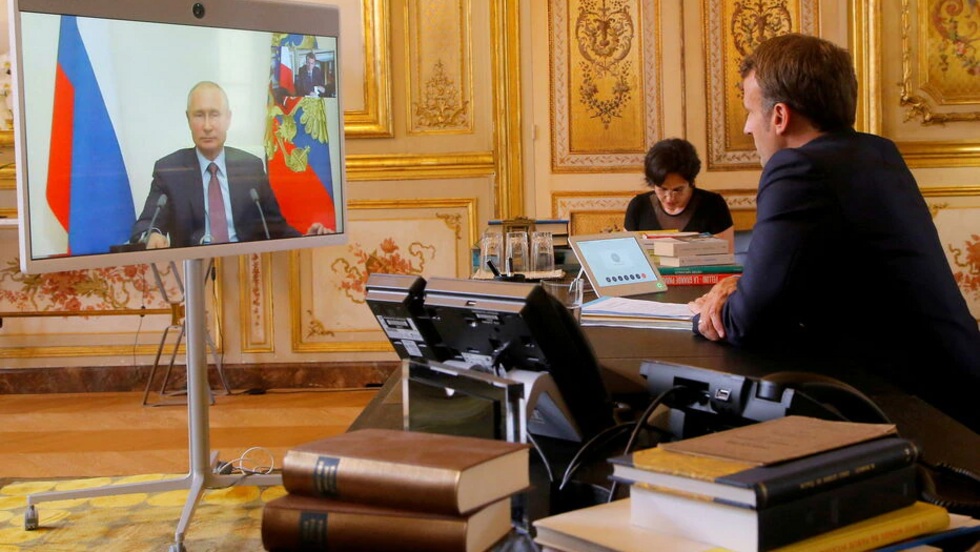In a rare diplomatic breakthrough, French President Emmanuel Macron spoke with Russian President Vladimir Putin on Tuesday, July 1, 2025, their first conversation in over three years.
The call, lasting two hours, according to media sources, focused on the escalating crisis surrounding Iran’s nuclear program, as Tehran announced it would cease all cooperation with the United Nations’ nuclear watchdog, the International Atomic Energy Agency (IAEA).
Macron’s decision to re-engage with Putin marks a notable shift.
Since Russia’s invasion of Ukraine in 2022, the French leader had refused any direct contact with Moscow.
However, with global tensions rising and diplomacy stagnating, Paris appears to have concluded that silence was doing little to resolve mounting international challenges, particularly in the Middle East.
French officials, while cautious, said Macron came away from the conversation “more optimistic” that Russia could use its leverage with Tehran to help restore some level of cooperation with the IAEA.
The goal: to prevent Iran from crossing critical nuclear red lines, while creating space for diplomatic solutions.
At the center of the current impasse is Iran’s recent legislation, passed by its parliament and approved by President Masoud Pezeshkian, to end formal cooperation with the IAEA.
The move follows Israeli strikes on Iranian nuclear facilities earlier this year, strikes that Tehran claims are violations of international law and the nuclear non-proliferation treaty.
Iran cited the IAEA’s failure to condemn these attacks as a major reason for its withdrawal from oversight.
In Berlin, the German foreign ministry strongly criticized Iran’s decision, warning that cutting ties with the IAEA sends a “disastrous signal” and makes a peaceful solution more difficult.
German officials confirmed they were notified in advance of Macron’s call with Putin, suggesting an effort by France to coordinate its diplomatic overtures with European partners.
French Foreign Minister Jean-Noël Barrot echoed this urgency in an interview with Le Monde.
While he acknowledged that Israel’s strikes may have slowed Iran’s nuclear program, he stressed that only a negotiated framework could ensure long-term stability.
He also underscored growing European concerns, pointing out that Iranian-designed missiles could potentially reach parts of Europe.
“Iran must not acquire a nuclear weapon under any circumstances,” Barrot stated.
The possibility of allowing Iran to enrich uranium domestically, a key point of contention, was not ruled out by French officials.
The 2015 nuclear deal, known as the JCPOA, had allowed for limited enrichment under strict monitoring, a model some diplomats see as a possible template for renewed negotiations.
The Kremlin’s official readout of the Macron-Putin call was notably conciliatory.
It emphasized Tehran’s right to pursue peaceful nuclear technology while also underlining the importance of working with the IAEA.
Both leaders reportedly agreed to keep in contact and align their positions as needed, signaling a tentative step toward cooperative crisis management.
Meanwhile, Iran’s move to isolate the IAEA further complicates efforts to understand the damage done to its nuclear infrastructure following joint U.S.-Israeli attacks.
Reports suggest a limited number of inspectors may still be on the ground, but their access is now highly restricted.
In a broader context, France is also working to revive momentum on another flashpoint: the Israel-Palestine conflict.
Barrot said Paris is in discussions with Saudi Arabia to schedule a long-postponed international conference on the two-state solution.
“There is an emergency in Gaza,” he said.
“We must restore a political horizon to escape the cycle of war and fulfill the legitimate aspirations of both peoples.”
The urgency is real.
According to Haaretz, during the recent 12-day conflict between Iran and Israel, Tehran launched more than 500 ballistic missiles.
The vast majority landed in open areas, while Israel’s air defense systems intercepted the rest.
Still, dozens of missiles struck built-up areas, with the cost of missile interception estimated at around 5 billion shekels ($1.3 billion).
The stakes in the Iran nuclear crisis are rising fast—and for Europe, diplomatic re-engagement with even the most difficult partners may now be seen as necessary, if not inevitable.







